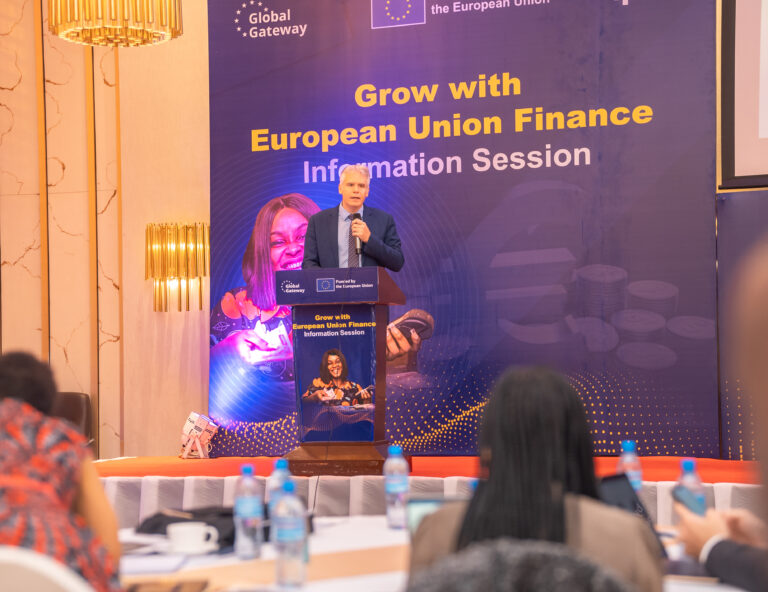The European Union (EU) held an information session in Tanzania titled “Growing with European Union Finance”, focusing on financing opportunities for local businesses under the Global Gateway Strategy. The session built on discussions at the Tanzania-EU Business Forum held in February 2023, which highlighted the need for improved access to finance.
The European Union (EU) recently conducted a highly productive information session titled “Growing with European Union Finance”, aimed at enabling Tanzanian businesses to take advantage of the numerous financing opportunities offered by the EU and its member states under the Global Gateway Strategy.
Building on the successful dialogue with the private sector launched at the Tanzania-EU Business Forum in February 2023, the session focused on resolving one of the main obstacles identified at that time: access to finance for emerging business, trade and expanding investment opportunities. The February forum saw the signing of several loan agreements between the European Development Bank and Tanzania’s local banks (NMB, CRDB and KCB), expanding financing provision for Tanzanian SMEs. Since then, the scope of the European lending window dedicated to the private sector has been steadily expanding.
The main objective of the information session was to provide concrete guidance on available financing instruments and the process of accessing these funds. A key highlight was the signing of a new Financing Tool Grant Agreement between the EU and the Financial Sector Deepening Trust (FSDT) worth 11.23 billion Tanzanian shillings (4 million euros), aimed at promoting inclusive financing to women- and youth-owned Small and Medium-sized Enterprises (SMEs).
More than 100 representatives from the banking sector, SMEs, MSMEs and various businesses participated and highlighted the importance of local businesses connecting with EU-led financial institutions through the Global Gateway’s financing tools.
Cedric Merel, Head of Cooperation at the EU Delegation to Tanzania, highlighted the EU’s comprehensive support for Tanzania’s business environment. “The business environment is essential for companies to thrive and finance is its lifeblood,” Merel said, adding that “the EU has provided a 360-degree approach to investment in Tanzania, including supporting the Blueprint regulatory reform agenda, strengthening domestic resource mobilization, strengthening capital markets, green and alternative finance, and attracting international finance.”
Edward Claassen, Head of the European Investment Bank’s (EIB) East Africa Regional Hub, reinforced this message by highlighting the EIB’s significant support for private sector efforts in Tanzania.
“Last year, Tanzania was the largest recipient of EIB assistance in sub-Saharan Africa, investing 758 billion Tanzanian shillings (270 million euros) in new support to businesses through partnerships with Tanzanian banks such as CRDB, NMB and KCB-Tanzania,” Mr Claassen said.
“Of the funds we signed, €166 million has already been disbursed by the EIB to banks and lent to more than 10,000 end beneficiaries, of which over 3,000 are women-led enterprises and over 900 are blue economy enterprises and cooperatives in Zanzibar,” he added.
The information session provided insights into the EU’s Global Gateway Strategy, which aims to tackle global challenges such as climate change, improving healthcare systems and strengthening global supply chains. The strategy includes a range of financial products such as grants, loans, equity and guarantees designed to benefit businesses of all sizes.
A key part of this strategy is the European Fund for Sustainable Development Plus (EFSD+), which encourages sustainable investments in partner countries by providing risk-sharing tools through partner financial development institutions. With a funding commitment of up to Ts112.34 trillion (EUR 40 billion), EFSD+ aims to mobilize up to Ts379.15 trillion (EUR 135 billion) of public and private resources worldwide to support the Sustainable Development Goals (SDGs).
Beyond EFSD+, the EU also supports start-ups and early-stage SMEs through initiatives such as the Funguo Innovation Programme, the PesaTech Accelerator Programme and the Serengeti Business Angel Network, which provide grants and investment opportunities. Additionally, the EU’s lending arm, the EIB, provides credit lines to local banks, which then disburse loans to SMEs, stimulating growth and innovation.
Gasper Mudi, president of the Tanzania Private Sector Foundation, said the financial opportunities provided by the EU are key to fostering a thriving entrepreneurial ecosystem in Tanzania.
“By working with local private sector organizations and focusing on inclusive growth, the EU ensures that diverse populations, including underrepresented groups such as women and youth, have access to the resources they need to succeed. This support not only boosts individual businesses, but also contributes to the country’s overall economic development,” Mdee said.


